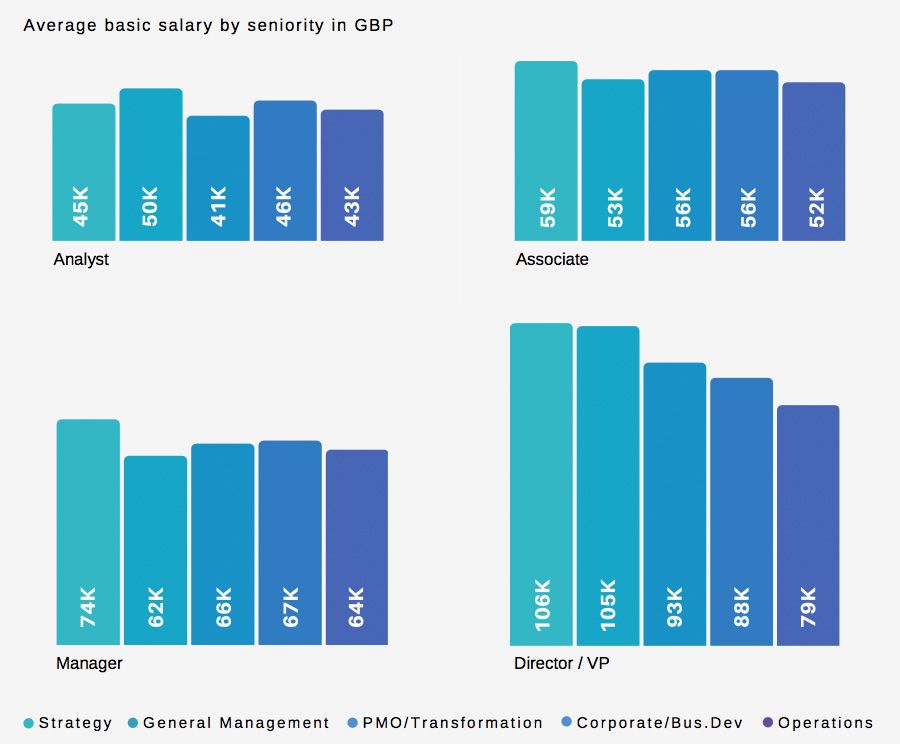
As many organizations seek to improve their productivity and reduce costs, there is an increasing demand for principal consulting. Consultants are also able to help companies implement new technologies or expand their reach in new markets. To become a principal consultant, you typically need a bachelor's degree in a relevant field, though many employers also prefer applicants with an MBA, a two-year course that includes coursework and a research project. Here are some ways to get started in this industry.
For principal consultants, the job outlook
The job outlook is generally positive for principal consultants, though there are many different job duties. Principal consultants' job responsibilities include project management, managing a team of talent, and helping businesses with difficult business problems. In addition, they may participate in thought leadership and business development work. While they typically work in teams, a principal consultant should be able to manage their own projects and work independently. Listed below are three trends to watch for in the career.
Education and experience: Candidates typically need a bachelor's degree to become a principal consultant. Many potential principal consultants hold a master's in business administration or another related field. Employers prefer candidates who have worked in relevant fields. Many organizations prefer candidates with at minimum a master's degree. Doctorates in relevant fields are also preferred. As for compensation, principal consultants make an annual mean salary of $80630.

Education required
Principal consultant is a top-ranking management position in a consulting company. Principal consultants have the responsibility of overseeing the work done by junior consultants. They also provide leadership and guidance to other members of the firm. You must have a minimum of five years' experience in consulting and a bachelor's level degree in a related field to be a principal consultant. As they may help you to develop leadership skills, you might also qualify as a principal advisor.
A principal consultant is usually responsible for recommending strategies that improve the company’s bottom line. They may also choose to specialize in a specific industry, such as health care or technology. This specialized knowledge will set you apart from other consultants. Common industries include human resources, finance, marketing, and engineering. The industry you want to work in will determine the type of education that you choose. A principal consultant often has industry-specific training.
Your earning potential
Experienced consultants can make more as principal consultants. Clients often seek out principal consultants who have more experience than 10 years. Additional training may be required to keep current with technological developments and regulatory changes. The median annual salary for consultants is $80630. But, the highest paid executives can make more than $163470. This article explains how earnings can be affected by principal consultants.
The median salary of a Principal Consultant varies depending on their experience and location. ZipRecruiter reports that an entry-level principal consultant can earn as much as PS82,500 annually. An average salary for a mid-career Principal consultant is Rs16.7 Lakhs. An average salary for a senior Principal Consultant is Rs16.7 Lakhs per year. Principal consultants with more years of experience are likely to earn higher than the national median.

Career path
To be successful as a principal advisor, you will need specific skills. Although many consultants have an extensive knowledge base, some consultants have the ability to differentiate themselves from their peers by having specific industry knowledge. Principal consultants who are interested in becoming certified in certain business areas will benefit greatly from their increased knowledge and experience. These certifications are a great way for you to stand out and showcase your expertise.
A principal consultant is responsible for managing all phases of projects. They often tackle difficult business problems. After being promoted to the position of principal consultant, they will be responsible for leading a firm’s strategic planning and business development work. They also need to generate new business and build client relationships.
FAQ
Who hires consultants?
Many organizations hire consultants to assist with projects. These can include small businesses and large corporations, government agencies as well non-profits and educational institutions.
Some consultants work directly for these organisations, while others freelance. In either case, the hiring process varies depending on the size and complexity of the project.
You will likely go through multiple rounds of interviews when hiring consultants before you choose the candidate you feel is the best fit for the job.
How long does it take to become a consultant?
Your industry and background will determine the length of time it takes. People start work with a few weeks before they find employment.
Some consultants, however, spend many years perfecting their skills before they find work.
How do I become a successful consultant?
Find an area that you are passionate about. Next, you need to establish relationships. Understanding your clients' needs and operating style is essential. And finally, you must deliver results for them.
While you don’t necessarily have to excel at every task, you should be better than all the rest. You need passion for what your do. It's not enough to just say "I want to be a consultant." It's important to believe in your abilities and do what you love.
Is it possible to run a consultancy business from home?
Absolutely! Many consultants do this already.
The majority of freelancers work remotely with tools like Skype. Many freelancers set up their own office space to avoid missing out on company perks.
Some freelancers prefer to work in cafes or libraries instead of in a traditional office environment.
Some people choose to work from their home because they like being close to their children.
Working from home comes with its own pros and cons. It's worth looking into if your job is fulfilling.
How do I choose the right consultant?
There are three main things to keep in mind:
-
Experience - How skilled is the consultant? Is she a beginner? Intermediate? Advanced? Expert? Does her resume demonstrate that she has the required skills and knowledge
-
Education – What did this person learn at school? Did he/she pursue any relevant courses once he/she graduated? Can we see evidence of that learning in the way s/he writes?
-
Personality: Do you like this person or not? Would we want him/her to work for us?
-
The answers to these questions help determine if the consultant is right for our needs. If the answers to these questions are unclear, it might be worth a first interview to get more information about the candidate.
Why should consultants be hired?
You might need consultants for a variety of reasons.
-
A specific project or problem may be a challenge for your company.
-
You want to improve your own skills or learn something new
-
You would like to work with an expert in your field.
-
There is no one else available to handle the task
-
It's overwhelming to see all the information, and you don't know how to get started.
-
You don't have the money to pay someone full time
The best way to find a good consultant is through word of mouth. Ask your friends and family if they know of any reliable consultants. Ask your friends and family for referrals if you know someone who is a consultant.
If you decide to use online directories like LinkedIn, use the "Search People" feature to look for consultants in your area.
Statistics
- Over 50% of consultants get their first consulting client through a referral from their network. (consultingsuccess.com)
- According to IBISWorld, revenues in the consulting industry will exceed $261 billion in 2020. (nerdwallet.com)
- "From there, I told them my rates were going up 25%, this is the new hourly rate, and every single one of them said 'done, fine.' (nerdwallet.com)
- So, if you help your clients increase their sales by 33%, then use a word like “revolution” instead of “increase.” (consultingsuccess.com)
- Over 62% of consultants were dissatisfied with their former jobs before starting their consulting business. (consultingsuccess.com)
External Links
How To
How do I start a consultancy company?
You can make a lot of money by setting up a consulting business. You don't have to have any business experience. A good place to start your own consulting company is to build a website. After you have built a website, social media platforms such Instagram, Pinterest and LinkedIn will be useful to spread the word about your services.
You can use these tools to put together a plan for marketing that includes:
-
Create content (blogs).
-
Contacts are essential for building relationships
-
Generating Leads (lead generation forms).
-
Selling products via ecommerce websites
Once you have created your marketing strategy you will need to find clients that will pay for it. While some people prefer to attend networking events and groups, others prefer online methods like Craigslist, Wikijiji, or Kijiji. Your choice is yours.
Once you have found clients, you should discuss terms and payment options. These could be hourly fees, retainer arrangements, flat-fee contracts, or other types of fees. It is important to clearly communicate with clients before you accept them as clients.
Hourly agreements are the most commonly used contract type for consultancy service. This agreement allows you to agree to provide services at a fixed price each week or month. You may be eligible to negotiate a discount, depending on the service that you offer. When you sign a contract, make sure you fully understand it.
Next, you will need to create invoices that you can send to your clients. Invoicing is one those things that seem so simple until you actually do it. There are many different ways to invoice your clients, depending on your preferences. You can choose to have your invoices sent directly to your clients or to print them and send them. No matter what method you use, ensure it works for your business!
Once you have completed creating invoices you will want to collect payment. PayPal is the most popular payment option because it's easy to use and provides multiple payment options. However, other payment processors are available, including Stripe, Square Cash, Google Wallet, Apple Pay, Venmo, etc.
Once you're ready and able to collect payments, you should set up bank accounts. You can keep separate checking and savings accounts to track income as well as expenses. Setting up automatic transfers into your bank account is also helpful when paying bills.
When you start a consultancy business, it may seem overwhelming, but once you learn how to do it correctly, it becomes second nature. You can read our blog post to learn more about how to start a consultancy business.
Starting a consulting firm is a great way to earn extra cash without worrying about employees. Remote consultants don't need to be tied down by office politics or work long hours. Since you are not tied down by regular working hours, you have more flexibility than a traditional employee.